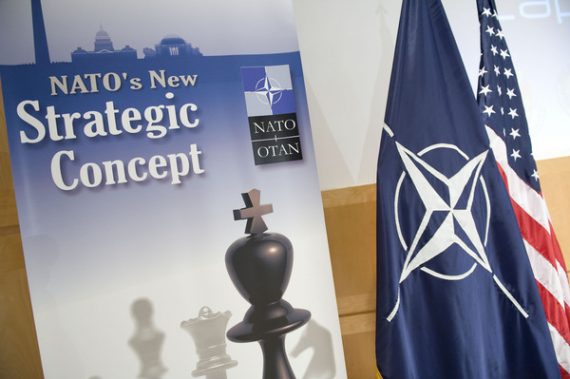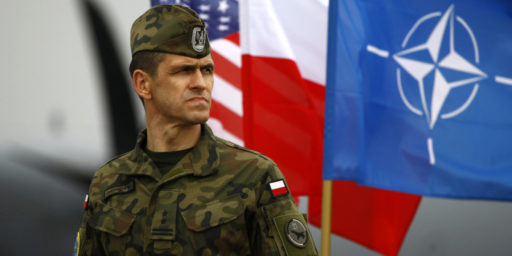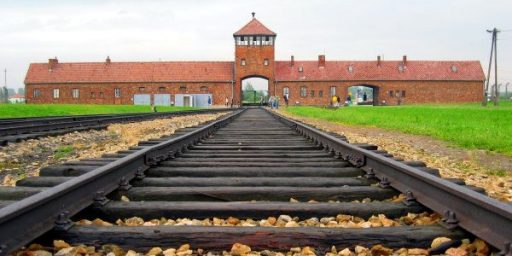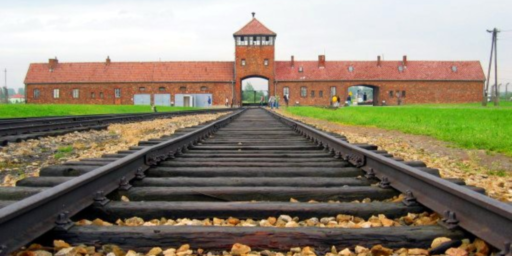Why NATO? A Europe Whole and Free
Daniel Larison's "The Case Against NATO" makes compelling reading. In my New Atlanticist post "The Case Against the Case Against NATO," I explain why it's wrong.
Daniel Larison‘s “The Case Against NATO” makes compelling reading. In my New Atlanticist post “The Case Against the Case Against NATO,” I explain why it’s wrong.
Larison argues that the main justification of NATO is to buttress America’s ability to project power into places where it has no business projecting power and that everything else — out of area operations such as Afghanistan, adding new members to form a club of democracies, and so forth — is just cover for that.
NATO’s premise from the very beginning was that we were all in this thing together. And that remains the idea behind the Alliance. “Out of area” and various mission sets are force planning concepts, not rationales for existence.
“Out-of-area” was not and is not about finding new conflicts to justify NATO’s existence. It was simply a recognition that, given the collapse of the Soviet Union and the absorption of a goodly portion of the Warsaw Pact into NATO, the likeliest security threats were outside Europe. The justification for the continued existence of a decades-old alliance was that it simply made sense for the West to continue working together to achieve our shared interests.
My objection to NATO expansion isn’t so much that doing so annoys Russia but rather that the prospective new members would make it even harder for NATO to do its business. Ukraine and Georgia are not Alliance-ready militaries. More importantly, it’s not at all clear that they share some fundamental Western values. But they might be ready at some point. So might Macedonia, if we can get over the impasse regarding their name. And there’s always our non-Atlantic partners in Australia and New Zealand.
But, again, the rationale for NATO expansion wasn’t the avoidance of obsolescence but rather the fulfillment of a purpose as old as the Alliance: A Europe whole and free. President George H.W. Bush explained this at his historic speech at the Rheingoldhalle in May 1989:
We must recall that the generation coming into its own in America and Western Europe is heir to gifts greater than those bestowed to any generation in history: peace, freedom, and prosperity. This inheritance is possible because 40 years ago the nations of the West joined in that noble, common cause called NATO. And first, there was the vision, the concept of free peoples in North America and Europe working to protect their values. And second, there was the practical sharing of risks and burdens, and a realistic recognition of Soviet expansionism. And finally, there was the determination to look beyond old animosities. The NATO alliance did nothing less than provide a way for Western Europe to heal centuries-old rivalries, to begin an era of reconciliation and restoration. It has been, in fact, a second Renaissance of Europe.
[…]
For 40 years, the seeds of democracy in Eastern Europe lay dormant, buried under the frozen tundra of the Cold War. And for 40 years, the world has waited for the Cold War to end. And decade after decade, time after time, the flowering human spirit withered from the chill of conflict and oppression; and again, the world waited. But the passion for freedom cannot be denied forever. The world has waited long enough. The time is right. Let Europe be whole and free.
To the founders of the alliance, this aspiration was a distant dream, and now it’s the new mission of NATO. If ancient rivals like Britain and France, or France and Germany, can reconcile, then why not the nations of the East and West? In the East, brave men and women are showing us the way. Look at Poland, where Solidarity, Solidarnosc, and the Catholic Church have won legal status. The forces of freedom are putting the Soviet status quo on the defensive. And in the West, we have succeeded because we’ve been faithful to our values and our vision. And on the other side of the rusting Iron Curtain, their vision failed.
The Cold War began with the division of Europe. It can only end when Europe is whole.
We had a group of countries cut off from the West through no fault of their own — indeed, some would say our fault — for decades that we were trying to get back into the fold. The Czech Republic, Hungary, and Poland were admitted to the Alliance ten years after Bush’s speech. Another nine have joined since. Their addition didn’t serve to justify NATO’s existence but rather to allow them to flourish without fear of Russian domination. It’s ability to provide that assurance is what justifies NATO’s existence.
More at the link.






Larison’s analysis of NATO’s condition is largely correct surely. Dean Acheson famously said the British had lost an empire and not yet found a role, and you can say the same about NATO. It’s raison d’etre was to contain the Soviet Union which no longer exists. Russia clearly has no plans to re-create it’s imperium in Eastern and Central Europe although that is not necessarily true in the case of territories like Georgia and Ukraine which were part of Russia for centuries. This underlying dynamic is probably well understood by European governments who in practice are never going to go war with Russia over the territorial integrity of Belarus (and will never therefore admit Georgia et al) but would be willing to fight for Poland. But Poland isn’t under threat so why do you need NATO. The desire of legitimate states like the Czech Republic to be members are partly about security but also about being seen as a grown up that has “joined the club.” When states are members of alliances which have no purpose and/or where their interests are not aligned then such alliances either collapse quickly or tend atrophy over time. Examples that spring to mind are the the alliances that defeated Napoleon, Imperial German and Hitler; the DreiKaiser bund; SEATO. And we had a long debate the other day about the non alignment of interests that bedevils the US/Pakistani alliance. As Larison points out none of the NATO members other than the US have any interest in fighting wars outside of Europe. So what keeps NATO alive? Inertia and bureacracy; a perception of increased diplomatic clout or access for lesser members; inward and outward cash transfers from arms sales and base costs; maintenance of the the US influence network and cover for unilateral US actions. That’s about it. NATO isn’t doing much harm although Larison may be right that it tempts the US into adventurism but we seem to have lost our enthusiam for this form of national validation. NATO looks good on paper, but it’s a bit of a house of cards, and ultimately card houses tend to fall down.
Was it Lord Ismay who said that the purpose of NATO was to keep America in, the Russians out, and the Germans down? It has succeeded in the first two of those objectives and only succeeded in the third if by it you mean prevent the Germans from expanding militarily.
If NATO is to continue to exist, our European allies must come up with a formula by which they appease their own domestic politics and make it worth our while. I can’t see Americans supporting NATO as the military expenditures of the European allies shrink, the clear preference of their own citizens.
BTW Jim perhaps I should have read your entire article at Atlantic rather than the summary above because in fact you spend a fair amount of time agreeing with Larison. The weakness in your basic case for the continuance of NATO is that it pivots on a continuing threat by Russia to those ancient and not so ancient central and Eastern European, and Balkan states like Poland, Bohemia, Hungary, Roumania, Bulgaria etc. which simply doesn’t exist. Russia doesn’t have territorial designs on Poland as it did in the 19/20th centuries. Of course it doesn’t want the US setting up shop in Poland anymore than we want China establishing a military presence in Mexico but that’s very different. By making a non existent threat the centerpiece of your case, you undermine rather than strengthen it. Much better to face the more modest reality that NATO is as Larison says an ok club of broadly democratic nations.
“and the Germans down? ”
This had ceased to be a goal of NATO by the early fifties. Germany was re-armed, Manstein was a military advisor to NATO and the head of West German intelligence was a former high official in Nazi Intelligence.
Dan and I are very similar in our foreign policy worldviews. I just think he’s wrong on the role of NATO and the politics behind keeping it.
The center of my case is common interests. “Keeping Russia out” is only a factor with regard to some of NATO’s newest members but it’s incredibly important there. It has allowed many of those countries to emerge much faster than they might otherwise have as vibrant new democracies.
I don’t think we need to build NATO around a specific threat. Instead, we want interoperability and combined efficiency. That’s especially important in an age of austerity.
“It has allowed many of those countries to emerge much faster than they might otherwise have as vibrant new democracies.”
It had nothing to do with it NATO, these economies were functioning well below capacity and Russia was on the ropes from 1990-2003.
“I don’t think we need to build NATO around a specific threat. Instead, we want interoperability and combined efficiency. That’s especially important in an age of austerity.”
But a specific threat is the core of your entire argument for NATO’s continued existence Viz:
“Their addition didn’t serve to justify NATO’s existence but rather to allow them to flourish without fear of Russian domination. It’s ability to provide that assurance is what justifies NATO’s existence.”
I’m afraid Jim you’re mixing up ends (what’s NATO for?) and means (interoperability and combined efficiency). The purpose of NATO’s existence is not these buzz words.
“I don’t think we need to build NATO around a specific threat. Instead, we want interoperability and combined efficiency. That’s especially important in an age of austerity.”
Yes, and much better to do your fighting alongside allied militaries than rent-a-soldier outfits like Xe.
The Russians aren’t coming and they never were.
The old scams are the best scams…
ponce says:
Thursday, October 7, 2010 at 13:02
“The Russians aren’t coming and they never were.”
Easy to say that in 2010. From 1945 to 1970 there was a declining probability they might come. After that any real threat had entirely disappeared and there’s certainly none now which is why Jim is making a big mistake in making it the centerpiece of his case.
“After that any real threat had entirely disappeared…”
Military spending according to da CIA:
Russia – $86 billion/year
China – $376 billion/year
Looks like the military/industrial complex should dump Russia and focus on demonizing China.
“Looks like the military/industrial complex should dump Russia and focus on demonizing China.”
Watch this space. Mind you some demonization isn’t entirely innappropriate if you watched that anniversary parade because behind all that goose stepping isn’t some broken backed economy as was the case in the Soviet Union.
@Joe:
Arguing from hindsight doesn’t make much sense in the context of an existential nuclear threat. But, again, Russia isn’t the centerpiece of my argument — it’s a response to Larison’s specific argument on NATO expansion.
@ponce:
Oh, they’ve been doing that for 20 years now.
James Joyner says:
Thursday, October 7, 2010 at 14:01
“But, again, Russia isn’t the centerpiece of my argument — it’s a response to Larison’s specific argument on NATO expansion.”
Larison isn’t debating NATO expansion, he’s saying there’s no reason for NATO to exist at all and you are arguing that there are good reasons for its continuance the most important of which was, YOU said:
“Their addition didn’t serve to justify NATO’s existence but rather to allow them to flourish without fear of Russian domination. It’s ability to provide that assurance is what justifies NATO’s existence.
And if this ISN’T the the centerpiece of your argument what is? The operational efficiency of NATO is an end in itself as you suggest above?
And apropos your argument above that all that economic expansion in Eastern Europe after the collapse of the Soviet Union happened principally because of the existence of NATO, I came across this chart comparing the economic well being of communist societies in 1991 and their Western comparators. They were so economically under capacity that a vast growth spurt was inevitable (Meanwhile CIS Russia couldn’t have invaded Disneyland it was in such chaotic state).
http://delong.typepad.com/
Jim: and since you seem to suffering from short term memory lapse here is the opening para of Larison’s essay on The Case against NATO:
“The goal of the North Atlantic Treaty Organization used to be, as its first secretary general, Lord Ismay, phrased it, “to keep the Russians out, the Americans in, and the Germans down.” Today, the only reason to keep NATO going seems to be to give Americans a reason to be “in” Europe when there is no longer any need for American military involvement in European affairs. Putting the alarmism of the past few years aside, Europe is under no threat from Russia, which the Europeans seem to understand far better than Americans do. And since its reunification, Germany has become the economic and political heart of a peaceful project of European union. Sixty years since its founding and nearly 20 years since the end of the Cold War, it is well past time to dismantle NATO.”
“Oh, they’ve been doing that for 20 years now.”
Not very effectively.
How many Americans even know what the Shanghai Cooperation Organization is?
NATO vs. the SCO has a nice ring to it.
:
@ ponce
“The Russians aren’t coming and they never were.”
LMBO!!!
@Brummagem Joe
“Easy to say that in 2010. From 1945 to 1970 there was a declining probability they might come. After that any real threat had entirely disappeared and there’s certainly none now which is why Jim is making a big mistake in making it the centerpiece of his case.”
Well,, Europeans have known for decades that the Russians were the dogs who barked loudest but didn’t have the teeth to bite.
And about 10 years ago I would have agreed with James Joyner, but now I’m convinced that NATO is needed more than ever. Russia’s paper chasing has lead them to firm some questionable “alliances” and I for one, am a bit squirmy !
I’m sorry, that was supposed to be “form” not firm…